Top fitness trackers for stress management include the Oura Ring 4 with its extensive stress scoring system, Ultrahuman Ring Air offering subscription-free analytics, and Fitbit Sense with specialized EDA sensors. The WHOOP Strap focuses on recovery optimization, while Samsung Galaxy Watch provides color-coded stress monitoring. Consider your tracking preferences and budget when choosing a device that will help you identify triggers and implement effective stress reduction techniques. Discover which features align best with your wellness goals.
How Fitness Trackers Measure and Monitor Stress Levels
While most people associate fitness trackers with step counts and calorie burning, modern wearable technology has evolved to track something equally important to your wellbeing: stress.
Most devices primarily measure Heart Rate Variability (HRV), which indicates autonomic nervous system balance. Lower HRV typically suggests higher stress levels due to reduced parasympathetic activity. Sophisticated algorithms analyze these patterns to estimate your stress level in real time.
Fitness trackers don’t rely solely on heart rate, which can be misleading. They integrate motion sensors to differentiate between exercise-induced and stress-induced heart rate increases. Many trackers also monitor your sleep patterns as disrupted sleep is a key indicator of elevated stress.
Some advanced devices like Fitbit and Google Pixel also incorporate Electrodermal Activity (EDA) sensors, which detect sweat gland activity associated with emotional arousal and stress responses.
Oura Ring 4: Premium Stress Detection With Sleep Integration
The Oura Ring 4 transforms your stress management with its extensive stress scoring system that analyzes heart rate variability, temperature, and movement patterns throughout your day.
You’ll benefit from personalized recovery optimization features, including mindfulness alerts during high-stress periods and activity-specific guidance based on your workout intensity.
The ring’s temperature-based illness detection capability monitors subtle skin temperature variations, potentially alerting you to signs of illness before symptoms become apparent. The device empowers users to understand their restorative time periods, representing critical moments when both body and mind can recharge effectively.
Stress Scoring System
Modern stress detection requires sophisticated algorithms to interpret bodily signals, which is precisely what Oura Ring 4 delivers through its extensive stress scoring system.
The ring utilizes multi-metric analysis combining HRV, heart rate, and skin temperature to create your personalized stress profile. You’ll notice how your sleep quality directly influences next-day stress resilience, as the system analyzes your deep sleep duration and nighttime HRV patterns. The fully titanium design provides durability while maintaining a sleek profile that’s comfortable for continuous wear during stress monitoring.
-
- The 18-path PPG sensor with red/infrared LEDs monitors oxygen saturation during sleep-related stress events, giving you thorough overnight data.
- “Symptom Radar” analyzes sleep deviations and temperature trends to alert you about potential illness before symptoms appear.
- Personalized baselines dynamically adjust using your historical data, ensuring your stress score remains relevant as your fitness improves.
- The 18-path PPG sensor with red/infrared LEDs monitors oxygen saturation during sleep-related stress events, giving you thorough overnight data.
Recovery Optimization Features
Beyond stress scoring, Oura Ring 4 excels in recovery enhancement through its seamless integration of sleep and activity data. You’ll receive personalized insights based on your biometric readings, with recommendations that adapt to your recovery needs. The rising trend in wellness metrics across the fitness tracking industry makes the Oura Ring 4 particularly valuable for comprehensive health monitoring.
| Feature | Benefit |
|---|---|
| Sleep Stage Tracking | Identifies ideal recovery periods during deep sleep |
| HRV Monitoring | Measures nervous system balance and recovery readiness |
| Strain Analysis | Prevents overtraining by tracking physical demands |
| Personalized Insights | Delivers tailored recovery recommendations daily |
| Continuous Tracking | Provides 24/7 monitoring without frequent charging |
The ring’s ability to correlate stress levels with sleep quality helps you make informed decisions about your recovery strategies. With real-time feedback and adjustable training intensity guidelines, you’ll enhance performance while minimizing injury risk.
Temperature-Based Illness Detection
While traditional fitness trackers merely count steps and calories, Oura Ring 4’s temperature-based illness detection represents a significant advancement in preventive health monitoring.
The ring’s “Symptom Radar” combines temperature anomalies with sleep disturbances and HRV dips to predict oncoming illnesses before you feel symptoms.
Your ring establishes personalized temperature baselines, filtering out environmental factors to isolate true physiological signals. You’ll receive actionable insights when the system detects concerning patterns that might indicate you’re fighting an infection. The digital temperature sensor works alongside smart sensing technology that includes 18 signal pathways for superior data quality compared to previous generations.
-
-
- Menstrual tracking identifies temperature shifts linked to cycle phases, helping you manage hormonal stress fluctuations.
- Recovery insights compare post-exercise temperature patterns to gauge stress-related recovery delays.
- Customizable thresholds let you adjust sensitivity for illness alerts based on your personal experience.
-
Ultrahuman Ring Air: Subscription-Free Stress Analytics
You’ll find impressive stress management capabilities in the Ultrahuman Ring Air without paying recurring fees for its extensive analytics.
The ring’s comfortable design enables consistent 24/7 monitoring of your heart rate variability, sleep quality, and daily stress patterns through its PPG sensor. Made from hypoallergenic materials, this device is designed for prolonged wear without causing skin irritation.
Its mobile app integration delivers actionable recommendations based on your personal stress rhythm scores, helping you identify triggers and improve recovery times.
No-Fee Advanced Insights
Unlike most modern fitness trackers that lock advanced analytics behind paywalls, the Ultrahuman Ring Air delivers extensive stress management insights without subscription fees.
You’ll receive personalized stress rhythm scores based on heart rate variability data collected through continuous PPG sensor monitoring. The Ring Air offers a one-time purchase with lifelong access to your personal data and all analytics. The device interprets non-specific data streams to provide tailored stress management recommendations that adapt to your lifestyle.
The Ring Air’s analytics are backed by substantial research involving:
-
-
- A diverse cohort of 27,885 users across 33 countries
- Thorough analysis accounting for age and gender differences in stress patterns
- Daily and diurnal stress tracking that integrates with your various activities
-
This continuous monitoring approach helps you understand stress triggers within the context of your daily routine, without the interruption of paywalls or premium tiers.
Comfortable 24/7 Monitoring
The effectiveness of any stress tracking solution relies heavily on consistent usage, which is why the Ultrahuman Ring Air’s comfortable design stands out in the wearable market. You’ll barely notice you’re wearing it while it continuously collects essential stress metrics like HRV and heart rate.
| Feature | Benefit |
|---|---|
| Compact ring design | Wear during sleep and activities without discomfort |
| 24/7 monitoring | Identifies stress patterns and triggers in real-time |
| Advanced sensors | Captures detailed HRV data without interruption |
Unlike bulkier alternatives, this lightweight ring integrates seamlessly into your daily routine. The continuous data collection provides early stress detection and personalized insights without requiring constant interaction. When high stress levels are detected, you’ll receive gentle reminders to practice breathing exercises—making stress management an effortless part of your lifestyle. The device’s integrated breathing pattern visualizations guide you through stress-relief techniques, providing immediate support when needed.
Fitbit Sense: EDA Sensors for Advanced Stress Monitoring
While most fitness trackers focus primarily on physical metrics, Fitbit Sense has pioneered stress monitoring through its innovative electrodermal activity (EDA) sensor technology.
The Sense 2 takes this further with its Body Response algorithm that continuously monitors stress markers without manual activation, combining EDA readings with heart rate, HRV, and skin temperature data. The algorithm is specifically disabled during exercise to prevent false stress readings when your body naturally shows similar physiological responses.
When the device detects a stress episode, you’ll receive real-time notifications prompting you to log your mood, helping the system learn your personal stress patterns over time.
-
-
- Daily Stress Management Scores integrate sleep quality, activity data, and heart metrics for thorough wellness insights
- Guided breathing exercises in the Relax app adapt to your real-time stress levels with haptic feedback
- Premium subscribers gain access to targeted meditation content and detailed stress trend analysis
-
WHOOP Strap: Recovery-Focused Stress Management
Designed specifically for recovery optimization, WHOOP Strap differentiates itself through its sophisticated stress monitoring approach that centers on heart rate variability (HRV) analysis. Your personalized stress score compares real-time HRV readings against your unique baseline, distinguishing between physical strain and psychological stress.
When you experience prolonged stress, you’ll receive timely alerts with science-backed interventions like cyclic hyperventilation and physiological sighs. WHOOP Support provides quick troubleshooting assistance if you encounter any issues with your device’s stress monitoring features.
| Feature | Benefit |
|---|---|
| Real-time HRV tracking | Continuous stress monitoring |
| Personalized stress scores | Accurate individual assessment |
| Science-backed breathing techniques | Immediate stress reduction |
| Integration with sleep data | thorough recovery insights |
| Alert system | Proactive stress management |
Unlike other devices, WHOOP doesn’t require additional sensors, seamlessly integrating stress management with sleep quality and recovery metrics for a holistic approach to your well-being.
Samsung Galaxy Watch: Comprehensive Stress Tracking Ecosystem
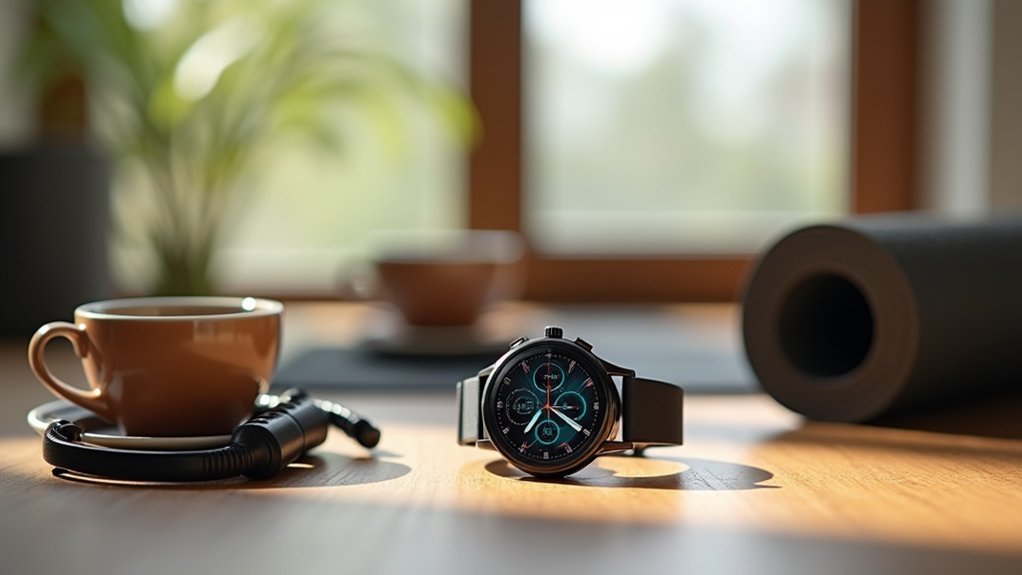
Combining cutting-edge biosensors with intuitive user interfaces, Samsung Galaxy Watch offers a thorough stress management system through its Health app ecosystem.
Using heart rate variability as the primary metric, the watch displays your stress levels on a color-coded graph—green for calm, red for high stress—while providing actionable insights to manage your mental wellbeing. For accurate measurements, make sure the watch is worn snugly on your wrist.
-
-
- Dual measurement options: Choose between on-demand stress checks or continuous monitoring, though the latter will impact battery life.
- Integrated breathing exercises: After detecting elevated stress, the watch guides you through calming breathing sessions.
- Cross-device synchronization: Track stress patterns over time with seamless data sharing between your watch and phone’s Samsung Health app.
-
While not medical-grade, the watch effectively identifies stress trends and encourages mindfulness throughout your day.
Best Practices for Using Fitness Trackers to Reduce Daily Stress
Fitness trackers offer more than just step counting—they’re powerful tools for managing daily stress when used strategically.
Monitor your heart rate variability (HRV) to catch stress responses early, then immediately engage in guided breathing exercises when alerts signal rising tension.
Customize your device to send regular break reminders, prompting you to step away from stressors for quick walking breaks or mindfulness moments. These timely interruptions prevent stress accumulation throughout your day.
Track sleep patterns alongside stress data to identify connections between poor rest and heightened anxiety. Use this extensive information to develop personalized stress management routines based on your unique triggers and responses.
Practice box-breathing techniques with your smartwatch by following the structured four-count pattern of inhaling, holding, exhaling, and holding for five-minute sessions that can provide immediate stress relief anytime, anywhere.
Finally, leverage historical trend data to identify recurring stressors, allowing you to make proactive lifestyle adjustments before stress escalates to unmanageable levels.
Frequently Asked Questions
Are Stress Metrics Accurate During Intense Workouts or Emotional Situations?
Stress metrics aren’t reliable during intense workouts, as exercise mimics stress responses physiologically. During emotional situations, accuracy is weak, with baseline classifications barely exceeding random chance and delayed physiological responses complicating real-time detection.
How Do Calibration Periods Affect Initial Stress Readings?
Calibration periods establish your personal baseline for stress detection. If you move or breathe irregularly during this phase, your initial readings won’t be accurate. Proper stillness during the 30-40 second setup guarantees reliable stress measurements.
Can Fitness Trackers Distinguish Between Good Stress and Harmful Stress?
No, current fitness trackers can’t distinguish between good and harmful stress. They measure physiological responses like HRV but you’ll need to interpret the context of your stress readings yourself for meaningful insights.
Do Waterproof Trackers Maintain Stress Monitoring While Swimming?
Most waterproof trackers don’t actively monitor stress while swimming. Your device may collect HRV data underwater, but accuracy is limited with wrist sensors. For reliable stress tracking during swims, you’ll need a waterproof chest strap.
How Often Should I Check Stress Data for Meaningful Insights?
Check your stress data daily and after stressful events for patterns. Review weekly summaries for trends. You’ll gain the most insight by monitoring at consistent times – morning and evening checks work well for most people.
In Summary
You’re now equipped to tackle stress with technology that works for your lifestyle. Whether you prefer the subtle approach of the Oura Ring, the subscription-free Ultrahuman, or the extensive features of Samsung’s ecosystem, these trackers provide valuable insights into your body’s stress signals. Remember to use these tools as part of a holistic approach—they’re meant to enhance, not replace, your intuitive understanding of your well-being.

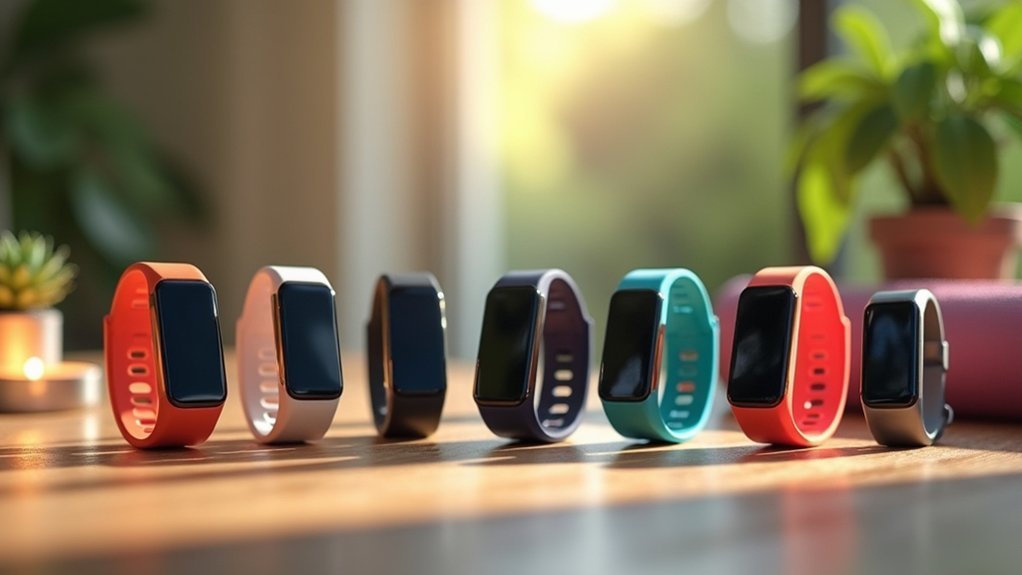
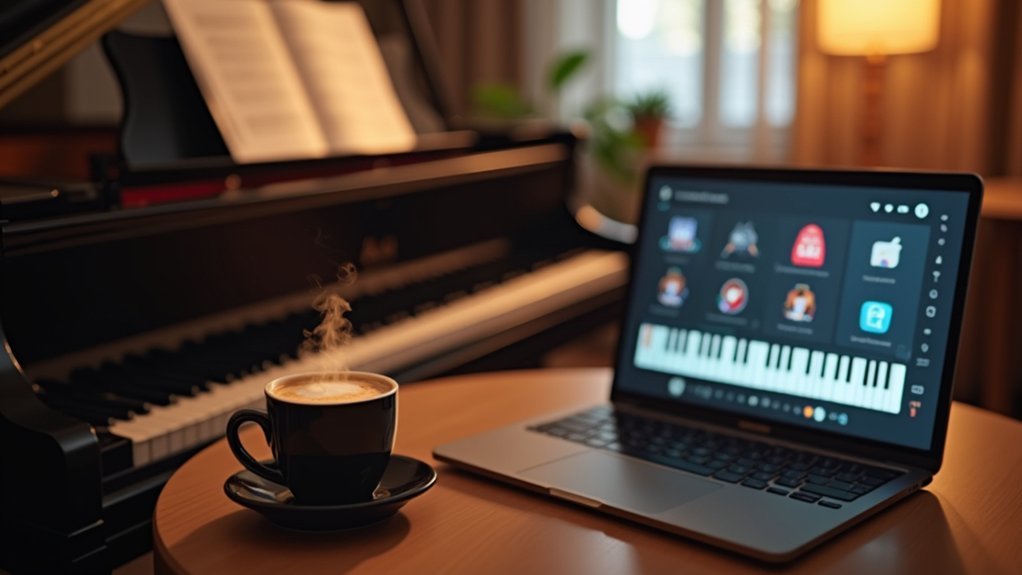
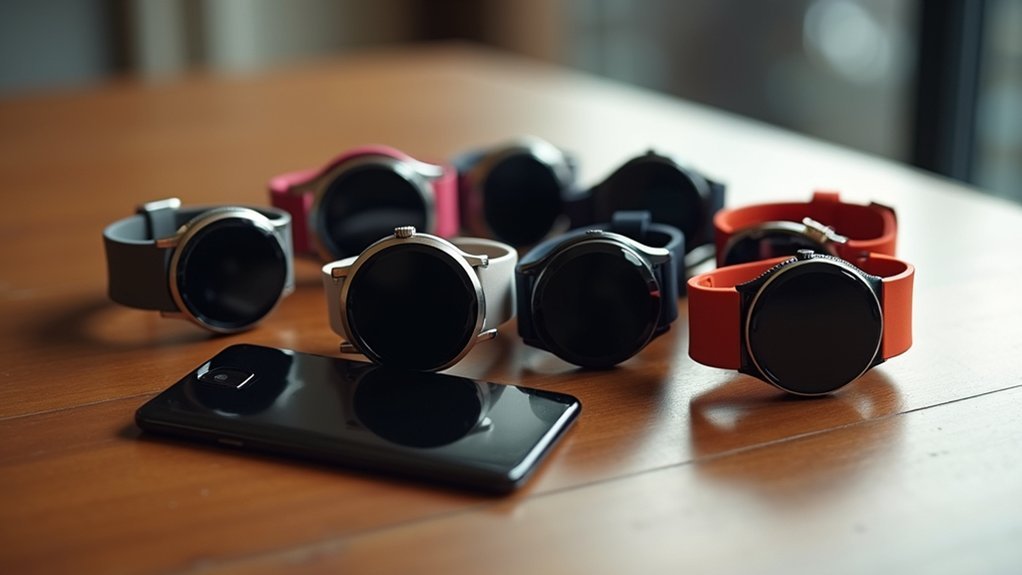
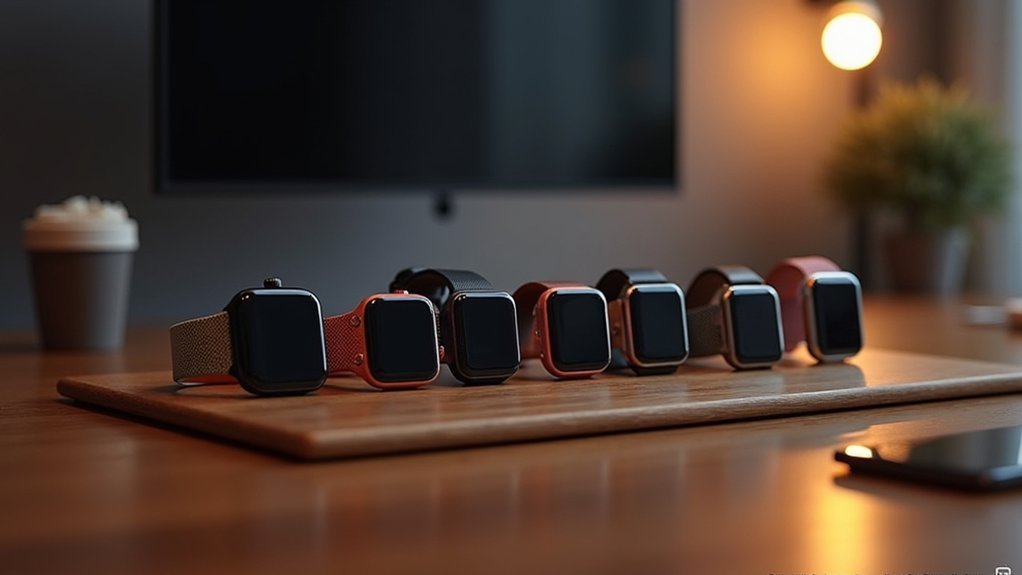
Leave a Reply